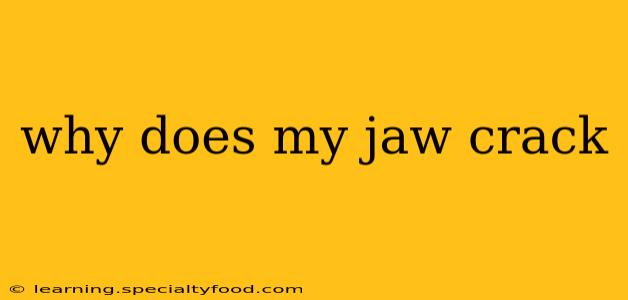A cracking or popping sound in your jaw joint is a surprisingly common experience. While often harmless, it can be a symptom of a more significant issue. Understanding the potential causes is crucial for addressing the problem and preventing further complications. This comprehensive guide will explore the reasons behind jaw cracking, addressing common concerns and providing insights into effective management strategies.
What Causes My Jaw to Crack?
The most frequent cause of a cracking jaw is a problem with the temporomandibular joint (TMJ), the complex hinge connecting your jawbone to your skull. This joint allows for a wide range of movement, from chewing and talking to yawning and opening your mouth wide. Several factors can lead to TMJ dysfunction and the accompanying clicking or popping sounds:
-
Ligament laxity: The ligaments supporting the TMJ can become loose or stretched, allowing for excessive movement and resulting in a clicking or popping sensation. This is often associated with general joint hypermobility.
-
Disc displacement: The articular disc, a cartilage pad within the TMJ, acts as a cushion between the jawbone and the skull. If this disc becomes misaligned or displaced, it can cause clicking, popping, or even locking of the jaw. This is a common source of TMJ disorders.
-
Arthritis: Degenerative joint diseases like osteoarthritis can affect the TMJ, causing inflammation, pain, and characteristic clicking or popping sounds. The cartilage within the joint may wear down over time, leading to bone-on-bone contact.
-
Muscle spasms: The muscles surrounding the TMJ can become tense and spasmodic, contributing to jaw pain and clicking. Stress, bruxism (teeth grinding), and poor posture are often implicated.
-
Injury or trauma: A direct blow to the jaw, a fracture, or even a whiplash injury can damage the TMJ and lead to clicking and popping.
Is a Cracking Jaw Always a Sign of a Problem?
Not necessarily. Many people experience occasional jaw clicking without experiencing any pain or limitation in jaw movement. This is often considered benign and may be related to simple ligament laxity or normal variations in joint mechanics. However, if the clicking is accompanied by pain, locking, limited jaw opening, headaches, or earaches, it’s crucial to seek professional medical advice.
Can Stress Cause My Jaw to Crack?
Stress and TMJ Disorders: A Strong Connection
Yes, stress can significantly contribute to TMJ disorders and the associated jaw clicking. When stressed, many people unconsciously clench or grind their teeth (bruxism), putting excessive pressure on the TMJ. This constant strain can lead to muscle spasms, disc displacement, and eventually, jaw clicking and pain. Stress also exacerbates existing TMJ issues, leading to increased frequency and intensity of symptoms. Managing stress through relaxation techniques, therapy, or lifestyle changes is crucial in mitigating TMJ problems.
What Happens If I Ignore a Cracking Jaw?
Ignoring a persistently cracking jaw, especially when accompanied by pain or other symptoms, is not advisable. Untreated TMJ disorders can worsen over time, potentially leading to:
-
Chronic pain: Persistent TMJ dysfunction can result in debilitating chronic jaw pain, affecting daily activities like eating and speaking.
-
Limited jaw movement: Severe TMJ disorders can restrict jaw opening, making it difficult to eat, talk, or even yawn.
-
Headaches and earaches: TMJ problems often radiate pain to the head and ears, causing additional discomfort.
-
Joint damage: Prolonged untreated TMJ issues can lead to irreversible damage to the joint, requiring more extensive treatment.
When Should I See a Doctor About My Cracking Jaw?
It’s important to consult a doctor or dentist if:
- The clicking is accompanied by pain.
- Your jaw locks or gets stuck open or closed.
- You experience limited jaw movement.
- You have headaches, earaches, or neck pain associated with the jaw clicking.
- The clicking worsens over time.
A healthcare professional can diagnose the underlying cause of your jaw clicking and recommend appropriate treatment.
How is a Cracking Jaw Treated?
Treatment options for a cracking jaw vary depending on the underlying cause and severity of the symptoms. They can include:
-
Conservative treatments: These may include pain relievers, muscle relaxants, ice/heat therapy, and physical therapy to improve jaw mobility and strengthen supporting muscles.
-
Splints or mouthguards: These devices help to relax the jaw muscles and prevent teeth grinding, reducing strain on the TMJ.
-
Injections: Corticosteroid injections may reduce inflammation in the joint.
-
Surgery: In severe cases, surgery may be necessary to repair damaged cartilage or realign the jaw joint.
This information is for general knowledge and does not constitute medical advice. Always consult a healthcare professional for diagnosis and treatment of any medical condition.
